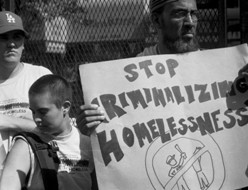Ez a cikk több mint 12 éves.
 • In December 2010, the clearing of Budapest underground passages begins under the supervision of Mayor István Tarlós. The extra funds that are promised as part of the program never reach the homeless care institutions.
• In December 2010, the clearing of Budapest underground passages begins under the supervision of Mayor István Tarlós. The extra funds that are promised as part of the program never reach the homeless care institutions.
• On 8 December 2010, Parliament adopts an amendment to the law on constructions, which allows for penalizing the improper use of public spaces as a petty offence.
• In December 2010, searching through garbage is banned in the 8th district.
• In April 2011, the General Assembly of Budapest adopts a decree pronouncing habitation in public spaces a petty offence. The very same decree makes street music subject to permission and a payable fee.
- In May 2011, Mayor Máté Kocsis calls for a district referendum to justify his penalizing policies against homeless people in the 8th district. Although the results are invalid due to low participation, the mayor fails to revoke the ban on rummaging through garbage claiming that it is supported by 80% of the voters.
- At the end of August 2011, Mayor István Tarlós talks about „homeless crime.”
- In October 2011, in line with a newly passed decree by Józsefváros, begging and the use of public spaces as habitual residence are also prohibited. Within a comprehensive „law-and-order” campaign hundreds of homeless people are subjected to short-term arrest.
- On 14 November 2011, Parliament passes the amendment of the Penal Code with effect from 1 December, initiated by FIDESZ MPs, which makes it a criminal offense to reside habitually in public spaces or to store belongings there. Repeat offenders risk imprisonment for up to 60 days or a fine of up to 150 thousand HUF (approx. 700 USD).
- On 23 December 2011, Parliament adopts the new Penal Code, which allows local governments across the country to punish habitual residence in public spaces and define further antisocial, forbidden behaviors. The new legislation takes effect on 15 April 2012.
- In May 2012, the Commissioner for Fundamental Rights applies to the Constitutional Court requesting the repeal of the legislation criminalizing homelessness.
- In November 2012, the Constitutional Court rules that penalizing homelessness is unconstitutional and annuls the aforementioned act. The Constitutional Court deems homelessness a social issue, which should not be addressed through law enforcement. By a complementary decree of the court, all penalty fees have to be paid back to those who had been fined under the law.
- In January 2013, barriers appear with „construction work” and „slippery surface” signs in several underground passages of the capital. Their purpose, however, is clearly not to ensure public safety, but to keep homeless people away.
- On 11 March 2013, Parliament adopts the 4th amendment of the Fundamental Law, which permits Parliament or local governments to restrict the use of public spaces for habitation in order to preserve public order, public safety, public health and cultural values.
- A few days after the adoption of the 4th amendment, in April 2013, the Minister of Interior submits another amendment to the Penal Code, which resumes the prohibition of habitual residence in public spaces, and, also prohibits the building of shacks in public spaces.
- In April 2013, the Commissioner for Fundamental Rights applies to the Constitutional Court for a review of the Fundamental Law, which does not find any formal inadequacies. Due to the 4th amendment, the Court is not allowed to examine the contents of the new constitution.
- In spring 2013, key international organizations criticize the 4th amendment, including its articles permitting the penalization of homelessness, while the Venice Convention and the European Parliament strongly disapprove of the Hungarian government’s actions in their reports.
- Rákosmente is the first district in the capital acting upon the measures of the Fundamental Law forbidding habitation in public space as well as picking through garbage on residential waste days and in recycling bins with effect from 15 July 2013.
Ezt a cikket eredetileg az AVM régi blogján publikáltuk.
